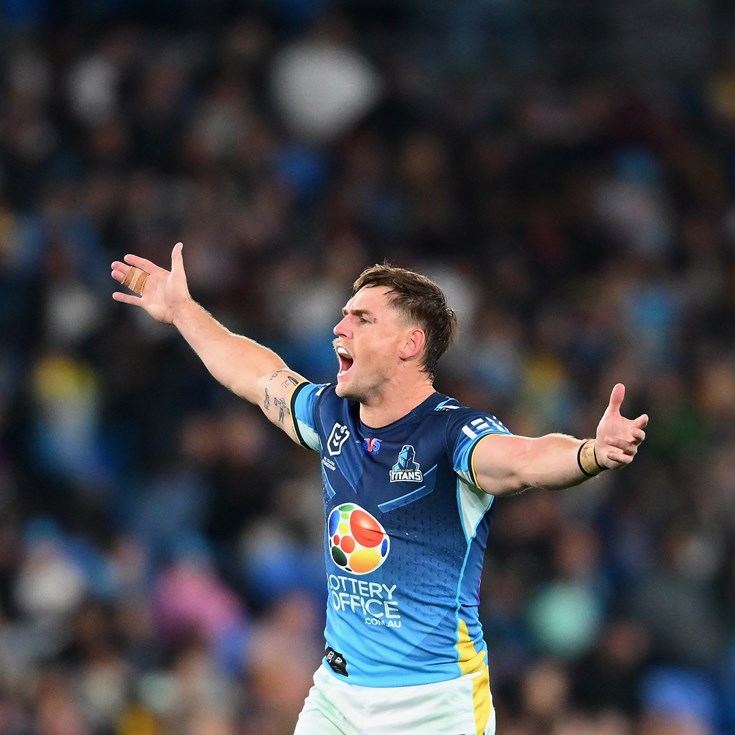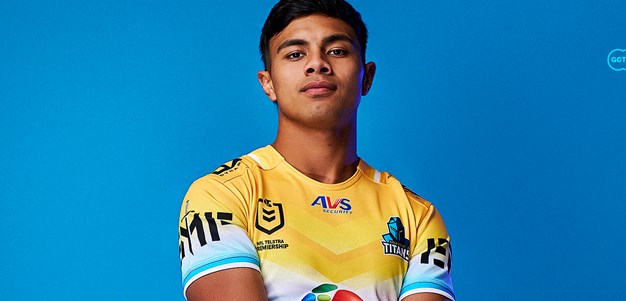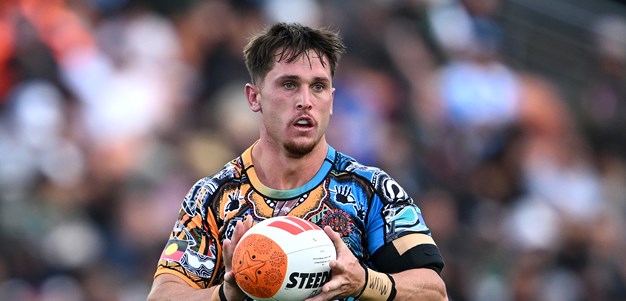
WARNING: Aboriginal and Torres Strait Islander readers are advised that this article contains the name and image of an Indigenous person who has died.
From the quiet streets of Tweed Heads, Lionel Morgan OAM’s rise as a rugby league trailblazer changed Australian sport forever.
A proud Bundjalung man, Lionel was the first Indigenous player to represent Australia in any major sporting code.
Lionel started his representative rugby league journey as a child, playing for the NSW Primary School team while he attended the local Tweed Heads Public School.
A lightning-fast winger, those who watched him play described his playing style as fast, determined and revolutionary.
Lionel began playing for Tweed Seagulls Rugby League Club growing up, with his games at Piggabeen Oval (formerly Tweed Heads Recreation Grounds) being a whole family affair.
Lionel’s niece Diane Weir said she has fond memories of the family heading down to the grounds at Tweed Heads to watch Lionel and his brothers play.
"When all the boys played for Tweed, Nanna (Ruby Morgan) would have the enviable task of washing the teams’ jumpers, and in those days, she would boil them in the copper in the backyard," Weir said.
"Nanna would never let anyone stand in his way of playing footy.
"Especially if it were because he was Indigenous. The racism that they faced was just shocking.
"She was the fighter behind him, she would never let anyone get in the way of him playing football.
"He had beer bottles thrown at him when he was on field early in his rugby league career.
"Once he started playing at a high level, everyone wanted to know him. The racism towards him halted a bit."
When interviewed by the Sydney Morning Herald in 2010, Morgan discussed the racist attacks that occurred throughout his career.
"I once was tackled over the sideline, and apparently the whole team jumped on top of me... I woke up in hospital," he said.
"Another time, I had scored a try and as I was walking back, in them [sic] days the sideline was there, and the spectators were only a metre away.
"I was punched by a spectator and woke up in hospital.
Lionel was an instrumental part of the Tweed All Blacks team - a side specifically for Aboriginal and Torres Strait Islander players in the region.
The side were famously known for their premiership win over Gold Coast Titans founding chairman, Paul Broughton’s Murwillumbah Brothers side in 1958.
Lionel’s son, Earl Morgan recalled fond memories of his dad talking about the late Paul Broughton OAM, Tom Searle and the infamous grand final in 1958.
"He said it was a very hard game. It was in Murwillumbah, and it was very close. They had great players on both sides," Earl Morgan said.
"There were no fights. They shook hands. They acknowledged each side for a fantastic game.
"Paul was one of my dad’s best mates growing up. He had a lot of respect for him and Tom Searle.
"They are two men who were absolutely instrumental in Rugby League on the Gold Coast."
The following season, Lionel made a move to Brisbane to continue advancing his rugby league career.
Weir said that when he shared the news with his fellow teammates, there were some doubts about whether he would permanently leave his home in Tweed Heads.
"He absolutely loved the Tweed. He was born and raised here," she said.
"A few of his mates would tease him and say, ‘there’s no way you will stay up there in Brisbane’ and he would reply with ‘the next time you see me, you’ll have to pay to see me."
After successful seasons at Wynnum-Manly and multiple appearances in the Queensland jersey, Lionel was selected to represent Australia - a moment that would define his legacy.
He made a huge impact in his time wearing the nation’s jersey, scoring two tries in his debut Test game against France, as part of a resounding 56-6 win in Brisbane in 1960.
His son spoke about his dad’s memories of playing for Australia.
"The crowds took a bit of getting used to," Earl Morgan said.
"He had never seen crowds that big before. The commentary from the spectators as well took getting used to.
"He didn’t struggle with the crowds, but he just couldn’t believe the size of them.
"He got to play his first game for Australia at the Brisbane Exhibition Grounds. In his home state, in front of his family.
"His mum organised ten buses to transport all his family and friends from Tweed Heads up to Brisbane. It was extraordinary.
"It didn’t matter if there were fans who supported New South Wales and hated him in a Queensland jersey. Everyone banded together and he became their idol in the Australian jersey."
At a time when First Nations people were still unable to vote or hold passports, his niece described the troubles Lionel ran into trying to travel overseas to represent Australia.
"For Lionel to play in the Australian side, they had to go to the federal government and apply for an exemption for him to get a passport," she said.
"He played for Australia for seven years before Aboriginal and Torres Strait Islander people were even able to vote or have the same rights as other Australians."
Prior to the introduction of the NRL and the now sanctioned State of Origin games, Lionel played 12 games for Queensland, and an additional four games in the Maroon jersey against visiting international sides.
Earl recalls his father’s comments about rugby league being the game that brought everyone together.
"He would often talk about how playing on the rugby league field was the leveler for everyone on the field," he said.
"He played alongside politicians, doctors, lawyers, publicans… the game brought everyone together."
Gold Coast Titans life member and driving force behind the NRL All Stars game, Preston Campbell OAM described Lionel as a strong and talented man.
"In terms of football, he was an amazing talent," Campbell OAM said.
"Back in the day, because there wasn’t a club land as such, you really needed to stand out, especially to play for Australia.
"As I’ve gotten older, I now have a deeper understanding of the strength, patience, determination and tenacity that he had.
"Australia was different back then compared to what we have to face these days.
"For him to still be playing on field, but also to still enjoy it while facing what he had to face, shows how strong he was.
"He would’ve had many reasons to stop playing, yet he kept going."
Lionel’s impact wasn’t just felt on the field. Those around him describe his impact for young Indigenous people as instrumental.
"He was a real role model for those around him." Weir said.
"On the field, he always played in the spirit of the game. He was a true gentleman."
Lionel’s legacy did not end when he officially retired from playing. He went on to be a mentor, coach and leader off the field.
"He really enjoyed partaking in different events like the annual Murri Carnival or coaching different junior rugby league teams up in Brisbane," she added.
"With the All Stars game, he was quite involved with Preston Campbell and he ended up being a mentor for the Indigenous U16s side.
"Preston used to visit him in his nursing home, and I know he enjoyed spending time with him a lot."
Following his retirement from playing, Lionel went on to pursue a career in the Port of Brisbane as Head Dredge Master, while balancing his role as Elder of the Murrie Court in Cleveland, and his coaching and mentoring of junior players at Wynnum-Manly.
"He started coaching junior teams while he was still playing as captain and coach at Wynnum in 1964," Morgan junior said.
"There are still a couple of guys that I see regularly that still talk about his positive influence on them both on the field with their game, but also off the field with the message he instilled in them.
"They saw what he could achieve, and he had a dream that he wanted to pursue, and he made sure they knew they were no different if they wanted to be a footballer, or go down other work avenues."
In 2008, Lionel’s contribution to rugby league was officially recognised when he was named as part of the NRL Indigenous Team of the Century, celebrating the profound achievements of Aboriginal and Torres Strait Islander players in the game’s history.
Following his passing, he was officially inducted into the NRL Hall of Fame and posthumously awarded an Order of Australia Medal for his outstanding achievements both on and off the field.
Lionel’s son recalls what it was like seeing his late father be recognised for his achievements.
"It was incredible. It was absolutely amazing," he said.
"Because it had been so long past when it had happened, it was a monumental occasion.
"There were modern-day players who had not long just finished their own careers.
"Yet dad achieved what he did over 60 odd years ago and he was finally being recognised.
"As a country and as a community we need to be better at recognition."
Lionel’s key message for young Indigenous people was simple: work hard to achieve your dreams.
He used to say... 'no one will give you anything but if you give hard work then someone will take you on board and give you an opportunity.'
"And that’s what he did. He achieved his dream," Weir said.
Campbell OAM echoed Lionel’s message and the story of his life.
"There is a real message in his story, I think. In rugby league, we speak about it bringing us together and understanding each other more," he said.
"It shows to everyone the opportunity we have to come together and create change through the game, and that is exactly what Lionel did."
Morgan retired from the game he loved having laid the foundation for future generations of First Nations athletes to chase their dreams.
This Reconciliation Week, the Titans acknowledge the profound impact Lionel Morgan OAM had in Tweed Heads, the wider rugby league community and in Australia.
The Gold Coast Titans are proud to walk in the footsteps of leaders like Lionel, and to carry forward his legacy by standing up for equity, opportunity, and truth-telling – both on and off the field.










